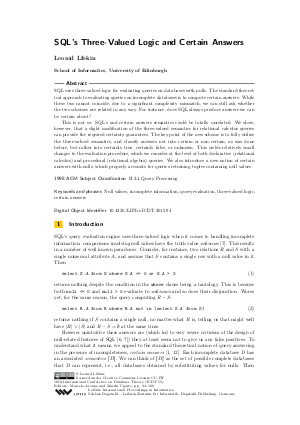SQL's Three-Valued Logic and Certain Answers
Author Leonid Libkin
-
Part of:
Volume:
18th International Conference on Database Theory (ICDT 2015)
Part of: Series: Leibniz International Proceedings in Informatics (LIPIcs)
Part of: Conference: International Conference on Database Theory (ICDT) - License:
 Creative Commons Attribution 3.0 Unported license
Creative Commons Attribution 3.0 Unported license
- Publication Date: 2015-03-19
File

PDF
LIPIcs.ICDT.2015.94.pdf
- Filesize: 480 kB
- 16 pages
Document Identifiers
Subject Classification
Keywords
- Null values
- incomplete information
- query evaluation
- three-valued logic
- certain answers
Metrics
- Access Statistics
-
Total Accesses (updated on a weekly basis)
0PDF Downloads0Metadata Views
Abstract
SQL uses three-valued logic for evaluating queries on databases with nulls. The standard theoretical approach to evaluating queries on incomplete databases is to compute certain answers. While these two cannot coincide, due to a significant complexity mismatch, we can still ask whether the two schemes are related in any way. For instance, does SQL always produce answers we can be certain about? This is not so: SQL's and certain answers semantics could be totally unrelated. We show, however, that a slight modification of the three-valued semantics for relational calculus queries can provide the required certainty guarantees. The key point of the new scheme is to fully utilize the three-valued semantics, and classify answers not into certain or non-certain, as was done before, but rather into certainly true, certainly false, or unknown. This yields relatively small changes to the evaluation procedure, which we consider at the level of both declarative (relational calculus) and procedural (relational algebra) queries. We also introduce a new notion of certain answers with nulls, which properly accounts for queries returning tuples containing null values.
Cite As Get BibTex
Leonid Libkin. SQL's Three-Valued Logic and Certain Answers. In 18th International Conference on Database Theory (ICDT 2015). Leibniz International Proceedings in Informatics (LIPIcs), Volume 31, pp. 94-109, Schloss Dagstuhl – Leibniz-Zentrum für Informatik (2015)
https://doi.org/10.4230/LIPIcs.ICDT.2015.94
BibTex
@InProceedings{libkin:LIPIcs.ICDT.2015.94,
author = {Libkin, Leonid},
title = {{SQL's Three-Valued Logic and Certain Answers}},
booktitle = {18th International Conference on Database Theory (ICDT 2015)},
pages = {94--109},
series = {Leibniz International Proceedings in Informatics (LIPIcs)},
ISBN = {978-3-939897-79-8},
ISSN = {1868-8969},
year = {2015},
volume = {31},
editor = {Arenas, Marcelo and Ugarte, Mart{\'\i}n},
publisher = {Schloss Dagstuhl -- Leibniz-Zentrum f{\"u}r Informatik},
address = {Dagstuhl, Germany},
URL = {https://drops.dagstuhl.de/entities/document/10.4230/LIPIcs.ICDT.2015.94},
URN = {urn:nbn:de:0030-drops-49791},
doi = {10.4230/LIPIcs.ICDT.2015.94},
annote = {Keywords: Null values, incomplete information, query evaluation, three-valued logic, certain answers}
}
